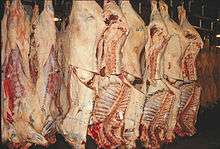Definify.com
Webster 1913 Edition
Carcass
Car′cass
(kär′kas)
, Noun.
pl.
Carcasses
(#)
. [Written also
carcase
.] 1.
A dead body, whether of man or beast; a corpse; now commonly the dead body of a beast.
He turned to see the
carcass
of the lion. Judges xiv. 8.
This kept thousands in the town whose
carcasses
went into the great pits by cartloads. De Foe.
2.
The living body; – now commonly used in contempt or ridicule.
“To pamper his own carcass.” South.
Lovely her face; was ne’er so fair a creature.
For earthly
For earthly
carcass
had a heavenly feature. Oldham.
3.
The abandoned and decaying remains of some bulky and once comely thing, as a ship; the skeleton, or the uncovered or unfinished frame, of a thing.
A rotten
carcass
of a boat. Shakespeare
4.
(Mil.)
A hollow case or shell, filled with combustibles, to be thrown from a mortar or howitzer, to set fire to buldings, ships, etc.
A discharge of
carcasses
and bombshells. W. Iving.
Webster 1828 Edition
Carcass
CARCASS
,Noun.
1.
The body of an animal; usually the body when dead. It is not applied to the living body of the human species, except in low or ludicrous language.2.
The decaying remains of a bulky thing, as of a boat or ship.3.
The frame or main parts of a thing, unfinished or without ornament. This seems to be the primary sense of the word. [See the next word.]CARCASS
,Noun.
Definition 2026
carcass
carcass
English

Beef carcasses (bodies of slaughtered animals with unwanted parts removed)
Alternative forms
Noun
carcass (plural carcasses)
- The body of a dead animal.
- 1989, Johannes Weigelt, Recent Vertebrate Carcasses and Their Paleobiological Implications, page 152,
- Plate 31, figure B shows a desiccated carcass in the ventral position with a sharp S curvature in the vertebral column. Such pronounced drying-out of a carcass probably happens only when it is quickly carried to a dry place and exposed to the strong rays of the sun.
- 1992, Dorothy L. Cheney, Robert M. Seyfarth, How Monkeys See the World: Inside the Mind of Another Species, page 284,
- Despite all of the groups' experiences with leopards and carcasses in trees, neither the vervets nor the baboons gave alarm calls at the sight of the carcass alone.
- 2005, Maria S. Johnson, Tim R. Nagy, Chapter 10: Animal Body Composition Methods, Steven B. Heymsfield, Timothy G. Lohman, ZiMian Wang, Scott B. Going, (editors), Human Body Composition, 2nd Edition, page 141,
- Instead, the majority of studies involve freezing the carcasses until time permits the analysis.
- 1989, Johannes Weigelt, Recent Vertebrate Carcasses and Their Paleobiological Implications, page 152,
- (meat trade) The body of a slaughtered animal, stripped of unwanted viscera, etc.
- 1961, D. M. Doty, John C. Pierce, Beef Muscle Characteristics as Related to Carcass Grade, Carcass Weight, and Degree of Aging, US Department of Agriculture, Technical Bulletin No. 1231, page 33,
- Lean flavor scores for this muscle were lower than those for ribeye, especially in Prime grade carcasses.
- 2000, P. D. Warriss, Meat Science: An Introductory Text, page 20,
- The most important is the carcass but the liver, kidneys and, to a limited extent, various other visceral components also have value as food items. […] For example, the carcasses from sheep and cattle have the head removed immediately after slaughter but in pigs this may be delayed until after chilling and further butchery.
- 2000, Geoffrey C. Mead, Fresh and Further-Processed Poultry, Barbara Lund, Tony C. Baird-Parker (editors), Microbiological Safety and Quality of Food, page 464,
- In some countries, there is still a significant trade in chicken carcasses that have been plucked, but not eviscerated, by the producer. Subsequently, the carcass may be eviscerated by a butcher or in the kitchen of the consumer.
- 1961, D. M. Doty, John C. Pierce, Beef Muscle Characteristics as Related to Carcass Grade, Carcass Weight, and Degree of Aging, US Department of Agriculture, Technical Bulletin No. 1231, page 33,
- The body of a dead human, a corpse.
- The framework of a structure, especially one not normally seen.
- (nautical) An early incendiary ship-to-ship projectile consisting of an iron shell filled with saltpetre, sulphur, resin, turpentine, antimony and tallow with vents for flame.
Usage notes
The form carcase is closer to Middle English spellings (carcays or carkeis).
Carcase may be more common in varieties of British English than it is in US English. For instance, in Australia, some newspapers use carcase, while others use carcass. The Australian Dept of Agriculture uses carcase for the sense body of slaughtered animal.[2]
Synonyms
- see Wikisaurus:corpse
Translations
body of a dead animal
|
|
body of a dead human — see corpse
frame